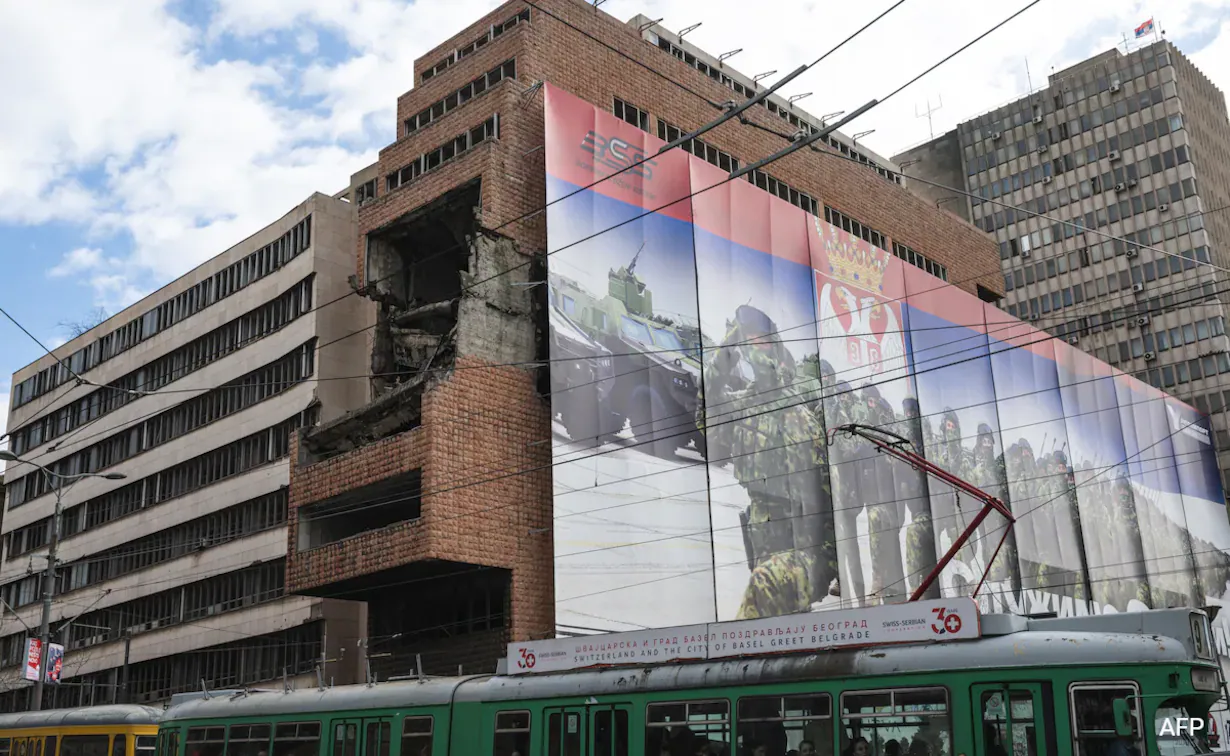A war-torn building in Belgrade, serving as a poignant reminder of the 1999 NATO airstrikes on Serbia, is poised to undergo transformation into a luxury hotel financed by Jared Kushner, Donald Trump’s son-in-law, sparking local outrage.
Kushner, a former advisor to his father-in-law during his presidency, recently announced his intentions to invest in upscale real estate projects in Serbia, with plans including the redevelopment of the former Yugoslav army headquarters.
Reports surfaced indicating that the Serbian government was set to transfer the building and its adjacent land to Kushner’s company, as disclosed by Serbian opposition member Aleksandar Jovanovic Cuta and corroborated by an investigation by the New York Times. Leaked blueprints proposed the erection of three towering glass structures near the Serbian defense and foreign ministries, with a 99-year lease granted to Kushner’s entity at no cost.
The proposed sale of the building has reignited deep-seated emotions among Serbians, who view it as a symbol of the 1999 US-led NATO bombing campaign that intervened in Kosovo to halt Serbian leader Slobodan Milosevic’s brutal suppression of ethnic Albanian separatists. The bombing, initiated on March 24, 1999, without UN Security Council approval, concluded in June of that year, marking the end of a conflict that claimed over 13,000 lives.
Despite its dilapidated state, the building remains a testament to the violation of international law, according to retired journalist Srdja Nikolic, who decried the disregard for the UN Charter during the 1999 intervention. For many locals like 28-year-old dental technician Sanja Handzic, the structure embodies their resilience during a tumultuous era.
The building, once the hub of the Yugoslav army, obtained “cultural asset” status from the Serbian government in 2005. Resident Jasminka Avramovic, 66, vividly recalls the devastation wrought by a bomb strike on the building, underscoring the enduring trauma of the bombings for many Serbians.
Memories of the NATO bombings linger in Serbia, with lingering resentment towards the alliance. Despite differing estimates of casualties, ranging from 500 to 2,500, the scars of the conflict remain raw for many, like 83-year-old Zoran Stosic, who advocates for preserving such buildings as reminders of the importance of peace and the horrors of war.
A war-torn building in Belgrade, serving as a poignant reminder of the 1999 NATO airstrikes on Serbia, is poised to undergo transformation into a luxury hotel financed by Jared Kushner, Donald Trump’s son-in-law, sparking local outrage.
Kushner, a former advisor to his father-in-law during his presidency, recently announced his intentions to invest in upscale real estate projects in Serbia, with plans including the redevelopment of the former Yugoslav army headquarters.
Reports surfaced indicating that the Serbian government was set to transfer the building and its adjacent land to Kushner’s company, as disclosed by Serbian opposition member Aleksandar Jovanovic Cuta and corroborated by an investigation by the New York Times. Leaked blueprints proposed the erection of three towering glass structures near the Serbian defense and foreign ministries, with a 99-year lease granted to Kushner’s entity at no cost.
The proposed sale of the building has reignited deep-seated emotions among Serbians, who view it as a symbol of the 1999 US-led NATO bombing campaign that intervened in Kosovo to halt Serbian leader Slobodan Milosevic’s brutal suppression of ethnic Albanian separatists. The bombing, initiated on March 24, 1999, without UN Security Council approval, concluded in June of that year, marking the end of a conflict that claimed over 13,000 lives.
Despite its dilapidated state, the building remains a testament to the violation of international law, according to retired journalist Srdja Nikolic, who decried the disregard for the UN Charter during the 1999 intervention. For many locals like 28-year-old dental technician Sanja Handzic, the structure embodies their resilience during a tumultuous era.
The building, once the hub of the Yugoslav army, obtained “cultural asset” status from the Serbian government in 2005. Resident Jasminka Avramovic, 66, vividly recalls the devastation wrought by a bomb strike on the building, underscoring the enduring trauma of the bombings for many Serbians.
Memories of the NATO bombings linger in Serbia, with lingering resentment towards the alliance. Despite differing estimates of casualties, ranging from 500 to 2,500, the scars of the conflict remain raw for many, like 83-year-old Zoran Stosic, who advocates for preserving such buildings as reminders of the importance of peace and the horrors of war.


















